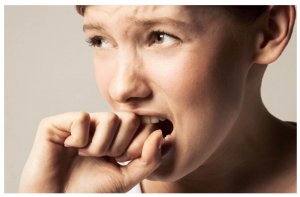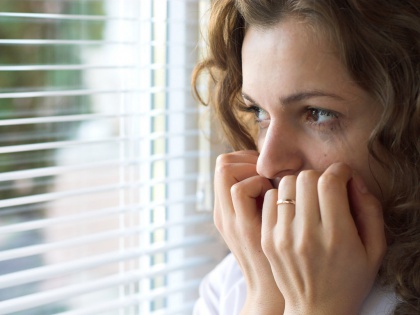14 Common Symptoms of Anxiety Attacks

Anxiety turns daily situations into a true challenge. Being aware of its presence is one of the first steps towards minimizing symptoms.
Remember that when a person experiences anxiety, in order to overcome it,the person must not focus on the symptoms. Their attention should be focused on more useful and practical things like doing constructive activities, physical exercise, relaxation, etc.
The goal is to avoid letting the symptoms produce distress after they’ve been recognized effectively. There will be some that you’ve already experienced, and some that are new. We know very well that we’re all very different biologically, which means we all react differently to an anxiety attack.

What are the symptoms associated with anxiety attacks?
1. Feeling like you’re suffocating and having difficulty breathing. These symptoms are some of the most distressing because it feels like someone is suffocating you with a pillow. It’s important to remember that this experience is produced by exaggerated nervous impulses. These symptoms can’t harm you. Your breathing will not stop.
2. Chest pain. This symptom is produced by muscular tension. Chest pain can cause a lot of fear because at first it feels like you’re dying of a heart attack. When this occurs in states of anxiety, it does not always start in the chest. Deep breathing and various relaxation exercises can help you reduce this symptom.
3. Heart palpitations. Anxiety produces an increase in adrenaline levels in the blood, which causes heart palpitations. This is something we’re not accustomed to. A reduction in cardiac rhythm is also a common characteristic of anxiety.
4. Pale skin. When you experience anxiety, blood flow is diverted away from your muscles during the “fight or flight” response. You go back to normal when the body starts to regulate itself after the attack. When this happens, some people turn pale.
5. Sweating. During periods of anxiety, the body’s temperature rises to prepare for fight or flight. To return to equilibrium, the body sweats to try to reduce its temperature.
6. Shaking and tremors. Shaking is a normal reaction to fear and/or a reduction in body temperature. When you suffer from anxiety it’s normal to experience shaking and chills. These will go away when the attack is over.
7. Shoulder and neck pain. These parts of the body tend to be the first to become tense when we’re under stress. The face tends to stiffen due to bodily rigidity, which causes muscular contractions.

8. Digestive problems. The digestive system is one of the areas where blood is most utilized. Blood is sent there to absorb nutrients from the food that we eat. During an anxiety attack, blood is diverted from the muscles to prepare for fight or flight. As a consequence, digestion is slowed down and the muscles around the stomach can tighten. This creates digestive problems like indigestion, stomach acidity, and diarrhea or constipation.
9. Skin problems. Some very common symptoms of anxiety and stress are breakouts and dry skin. Acne can appear around the nose, cheeks, and forehead. These will disappear when you start to feel better.
10. Weakness and tingling in the feet and hands. The fight or flight response is very intense and has a profound effect on bodily sensations. A tingling sensation is caused by the accumulation of carbon dioxide in the blood in one’s extremities. These symptoms are not harmful, and will return to normal with light exercise.
11. Dryness of the mouth. During an anxiety attack, bodily liquids are directed to other parts of the body. This is why the mouth is likely to become dry. To avoid this sensation, drink a lot of water to keep yourself hydrated and to lubricate the mouth. This symptom is not harmful, and will go away when the attack is over.
12. Insomnia. One of the most difficult effects of anxiety is insomnia: the inability to fall asleep or remain asleep. It’s important to recover sleeping patterns and regular schedules for your own personal well-being and to prevent daily anxiety.
13. Nightmares. Nightmares tend to reflect what’s happening in our daily lives. If we are relaxed and content, we’ll have positive and happy dreams. It’s true that nightmares are unpleasant but harmless, but they can affect your sleep cycle. To avoid them, practice relaxation exercises during the day and before you go to bed.
14. Irritability. People are more irritable when they’re tired or sick. One of the principal causes of anger is sadness. Anger is a normal reaction to fear.
These are some of the most common symptoms of anxiety, but the following can also occur:
- Fear of losing control.
- Increase in depression and suicidal thoughts.
- Distortion of vision.
- Disrupted hearing.
- Hormonal problems.
- Headaches and migraines.
- Eye pain.
- Agoraphobia
Anxiety turns daily situations into a true challenge. Being aware of its presence is one of the first steps towards minimizing symptoms.
Remember that when a person experiences anxiety, in order to overcome it,the person must not focus on the symptoms. Their attention should be focused on more useful and practical things like doing constructive activities, physical exercise, relaxation, etc.
The goal is to avoid letting the symptoms produce distress after they’ve been recognized effectively. There will be some that you’ve already experienced, and some that are new. We know very well that we’re all very different biologically, which means we all react differently to an anxiety attack.

What are the symptoms associated with anxiety attacks?
1. Feeling like you’re suffocating and having difficulty breathing. These symptoms are some of the most distressing because it feels like someone is suffocating you with a pillow. It’s important to remember that this experience is produced by exaggerated nervous impulses. These symptoms can’t harm you. Your breathing will not stop.
2. Chest pain. This symptom is produced by muscular tension. Chest pain can cause a lot of fear because at first it feels like you’re dying of a heart attack. When this occurs in states of anxiety, it does not always start in the chest. Deep breathing and various relaxation exercises can help you reduce this symptom.
3. Heart palpitations. Anxiety produces an increase in adrenaline levels in the blood, which causes heart palpitations. This is something we’re not accustomed to. A reduction in cardiac rhythm is also a common characteristic of anxiety.
4. Pale skin. When you experience anxiety, blood flow is diverted away from your muscles during the “fight or flight” response. You go back to normal when the body starts to regulate itself after the attack. When this happens, some people turn pale.
5. Sweating. During periods of anxiety, the body’s temperature rises to prepare for fight or flight. To return to equilibrium, the body sweats to try to reduce its temperature.
6. Shaking and tremors. Shaking is a normal reaction to fear and/or a reduction in body temperature. When you suffer from anxiety it’s normal to experience shaking and chills. These will go away when the attack is over.
7. Shoulder and neck pain. These parts of the body tend to be the first to become tense when we’re under stress. The face tends to stiffen due to bodily rigidity, which causes muscular contractions.

8. Digestive problems. The digestive system is one of the areas where blood is most utilized. Blood is sent there to absorb nutrients from the food that we eat. During an anxiety attack, blood is diverted from the muscles to prepare for fight or flight. As a consequence, digestion is slowed down and the muscles around the stomach can tighten. This creates digestive problems like indigestion, stomach acidity, and diarrhea or constipation.
9. Skin problems. Some very common symptoms of anxiety and stress are breakouts and dry skin. Acne can appear around the nose, cheeks, and forehead. These will disappear when you start to feel better.
10. Weakness and tingling in the feet and hands. The fight or flight response is very intense and has a profound effect on bodily sensations. A tingling sensation is caused by the accumulation of carbon dioxide in the blood in one’s extremities. These symptoms are not harmful, and will return to normal with light exercise.
11. Dryness of the mouth. During an anxiety attack, bodily liquids are directed to other parts of the body. This is why the mouth is likely to become dry. To avoid this sensation, drink a lot of water to keep yourself hydrated and to lubricate the mouth. This symptom is not harmful, and will go away when the attack is over.
12. Insomnia. One of the most difficult effects of anxiety is insomnia: the inability to fall asleep or remain asleep. It’s important to recover sleeping patterns and regular schedules for your own personal well-being and to prevent daily anxiety.
13. Nightmares. Nightmares tend to reflect what’s happening in our daily lives. If we are relaxed and content, we’ll have positive and happy dreams. It’s true that nightmares are unpleasant but harmless, but they can affect your sleep cycle. To avoid them, practice relaxation exercises during the day and before you go to bed.
14. Irritability. People are more irritable when they’re tired or sick. One of the principal causes of anger is sadness. Anger is a normal reaction to fear.
These are some of the most common symptoms of anxiety, but the following can also occur:
- Fear of losing control.
- Increase in depression and suicidal thoughts.
- Distortion of vision.
- Disrupted hearing.
- Hormonal problems.
- Headaches and migraines.
- Eye pain.
- Agoraphobia
This text is provided for informational purposes only and does not replace consultation with a professional. If in doubt, consult your specialist.







